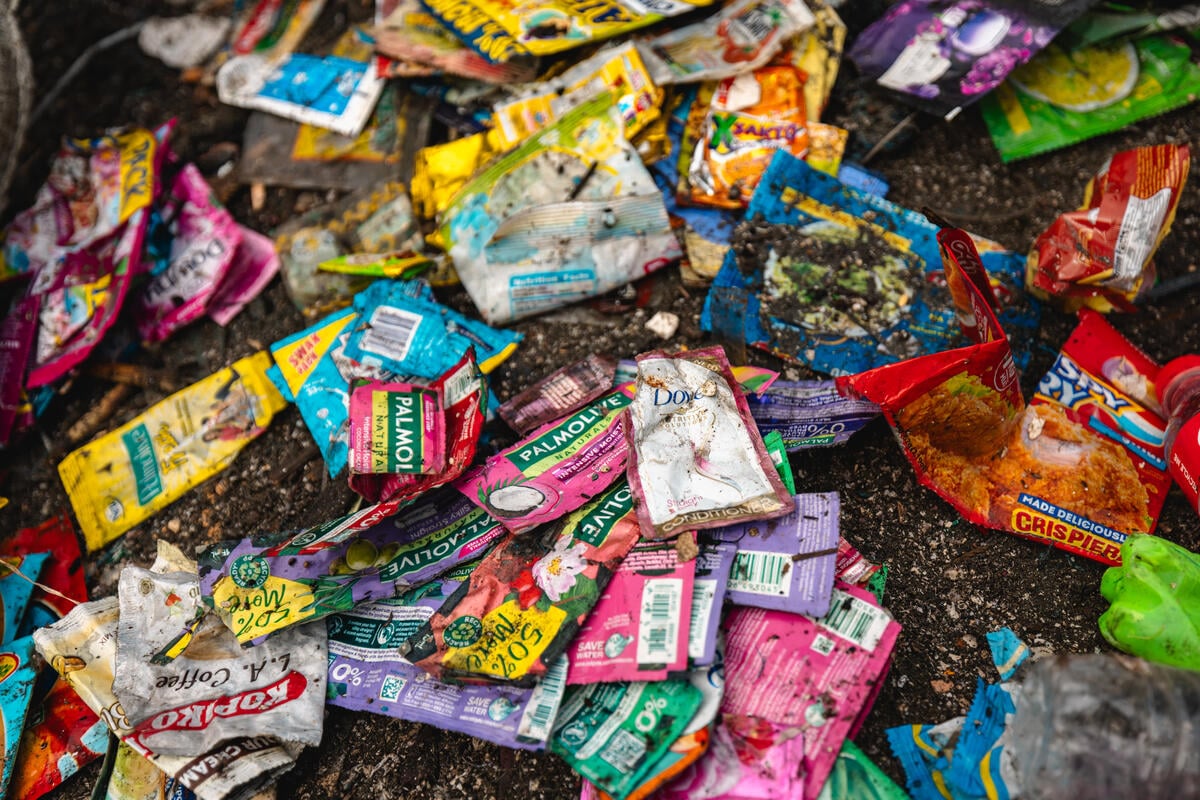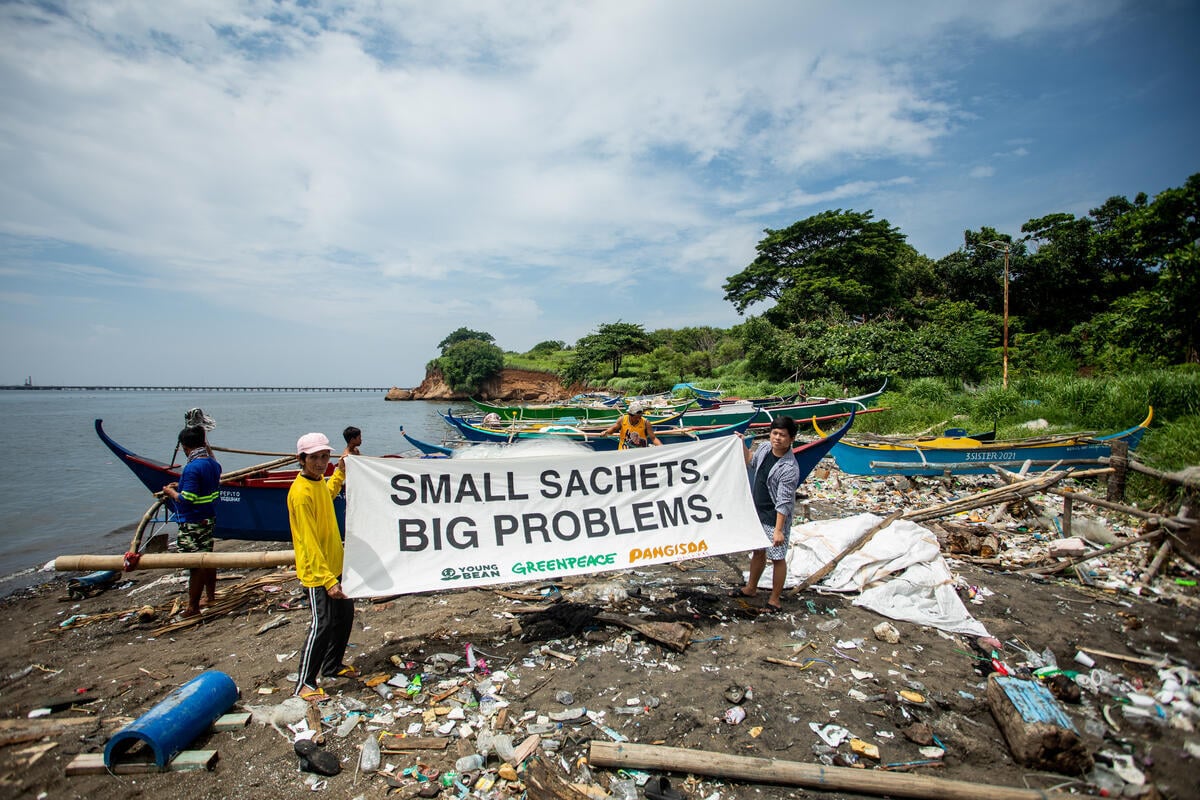Amsterdam, The Netherlands – A new Greenpeace International report released today reveals that over 50 million people in 11 countries [1] are at risk of exposure to hazardous air pollution from plastic linked petrochemical production. The findings intensify pressure on negotiators at the Global Plastics Treaty talks in Geneva to secure a treaty that tackles the problem at its source: plastic production.
Graham Forbes, Global Plastics Campaign Lead for Greenpeace USA and Greenpeace Head of Delegation for the Global Plastics Treaty negotiation said: “What this report shows is that the plastics crisis is a public health emergency. The Global Plastics Treaty must deliver a 75% cut in plastic production by 2040 to reduce escalating threats to human and planetary health. People are being poisoned so fossil fuel and petrochemical companies can churn out more unnecessary plastic. Without a treaty that cuts production, the plastic crisis will only grow worse.”
The report, Every Breath You Take: Air Pollution Risks from Petrochemicals Production for the Plastics Supply Chain, shifts the lens to midstream level plastic production—to the petrochemical plants that produce precursors to plastic and expose frontline communities living near to these facilities who are potentially facing exposure to dangerous air pollutants.
During the production of feedstock, petrochemical facilities emit a suite of harmful airborne substances typically including Volatile Organic Compounds (VOCs), nitrogen oxides (NOₓ), and sulfur oxides (SOₓ) and particulate matter (PM). Studies report higher concentrations of these pollutants near petrochemical facilities, with proximity linked to increased illness—raising a serious cause for concern.
Key findings from the report include:
- Over 51 million people in the 11 countries studied live within 10 km of plastics-linked petrochemical facilities; 16 million live within 5 km. In every country studied, residential areas lie within 10 km of plastic-linked petrochemical plants.
- The United States has the highest number of people living at a distance that is linked to elevated risk—13 million, especially in Texas and Louisiana.
- One in four people in the Netherlands live at a distance that is linked to elevated risk of exposure to air pollution emissions, including toxic emissions, from petrochemical plants. It has the highest proportion of its population at risk with 4.5 million people or 25.6% of the entire population within the exposure zones assessed in the analysis. The country with the second highest proportion is Switzerland at 10.9% of the population.
- The pollution created by some petrochemical plants in the regions reviewed for the report is transboundary. Several plants are located in border zones, affecting communities in Austria, Poland, Singapore, Belgium, France and Germany.[2]
- In documented case studies, communities near petrochemical facilities suffer disproportionately from cancer, respiratory disease, and premature death. The UN has labeled some of these areas “sacrifice zones.”
The report also warns of industry plans to expand global plastic production through 2050, which would create more sacrifice zones, more waste exported to low-income countries, and more short-lived products driving the climate, health and waste crisis.
The global Greenpeace network is demanding that the Global Plastics Treaty must reduce plastic production by at least 75% by 2040 to protect people’s health, the climate and the environment. The next round of negotiations will happen on August 5 to 14, 2025 in Geneva, Switzerland.
ENDS
Full report: Every Breath You Take: Air Pollution Risks from Petrochemicals Production for the Plastics Supply Chain
Photos and videos can be accessed in the Greenpeace Media Library.
Interactive maps of petrochemical production zones
Notes:
[1] The report, Every Breath You Take: Air Pollution Risks from Petrochemicals Production for the Plastics Supply Chain, identified the locations of petrochemical facilities linked to plastics in 11 countries: Philippines, Thailand, Malaysia, Indonesia, South Korea, Canada, USA, Germany, United Kingdom, Switzerland, and the Netherlands. The countries were selected because of their significant petrochemical presence or association with major plastic-related concerns.
[2] The transboundary zones include populations in Austria and Poland (from German facilities), Singapore (from Malaysian facilities) Belgium and Germany (from Dutch facilities) France and Germany (from Swiss facilities).
Contacts:
Angelica Carballo Pago, Global Plastics Campaign Media Lead, Greenpeace USA, +63 917 1124492, [email protected]
Greenpeace International Press Desk, +31 (0) 20 718 2470 (available 24 hours), [email protected]



